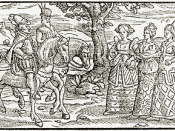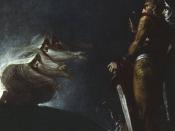Fate as most people think of it cannot exist. "Fate" suggests that there is one way that a situation is going to unfold, and nothing you can do will change the way it unfolds. Instead, there are always several "fates;" the one that eventually comes about depends on choices you make along the way. Sometime in hindsight it looks like that outcome is the only one that could have happened, or the best one that could have happened, but the truth is that it was only one of several possibilities.
Macbeth is usually seen to be a character that was not in control of his destiny. In reality, he was the one who decided how he was going to act, and in the end he sets his own fate. There was no "god" that was responsible. His wife was not and indeed could not have been the responsible entity in his future.
The witches, though influential, only showed him one of the several paths he may have possibly taken. Without Macbeth's consent, his wife would never go through with her plan for murder. When she tells him of her ideas, he goes along gladly.
Look like the time. Bear welcome in your eye,
Your hand, your tongue. Look like th' innocent
flower,
But be the serpent under 't. He that's coming
Must be provided for; and you shall put
This night's great business into my dispatch,
Which shall to all out nights and days to come
Give solely sovereign sway and masterdom.
(I.vi.75-82)
To this Macbeth replies only, "We will speak further." (I.vi.83) It is clear that he has made the decision to kill Duncan, whether or not he is prepared to admit it to himself or anyone else yet.
The witches, like Macbeth, were not simply pawns.


